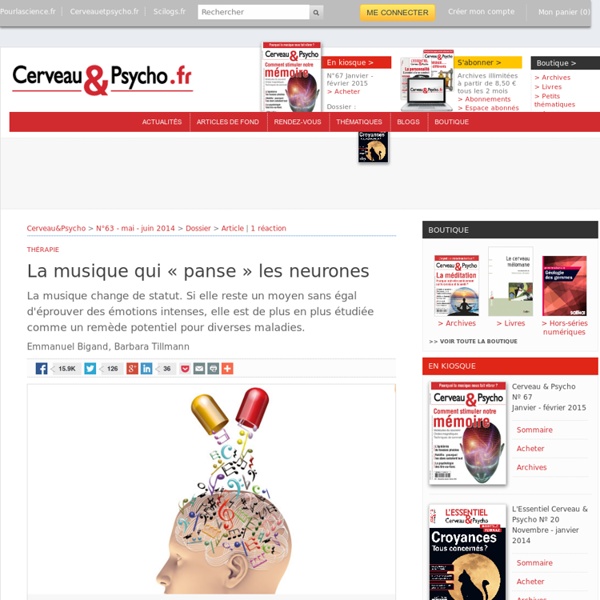La musique qui « panse » les neurones
L'auteur Emmanuel Bigand, professeur de psychologie cognitive, dirige le Laboratoire d'étude de l'apprentissage et du développement, UMR 5022, à l'Université de Bourgogne, à Dijon. Barbara Tillmann, directrice de recherche CNRS, dirige l'équipe Cognition auditive et psychoacoustique au Centre de recherche en neurosciences de Lyon, CNRS-UMR 5292, inserm U 1028, Université Lyon-I. Du même auteur La musique et la santé entretiennent des relations étroites depuis des temps immémoriaux. Combien de croyances, notamment médicinales, qui persistent aujourd'hui en Occident, relèvent-elles d'une pensée magique similaire ? Ces questions sont débattues depuis longtemps dans le cadre de la musicothérapie. Le pouvoir de la musique Le pouvoir de la musique ne se réduit certainement pas à « adoucir les mœurs »,...
Les artistes du Festival Planète Zen 2014
www.unissons.org L'Ensemble Unissons est une formation sonore et musicale à caractère « méditatif », « sonothérapeutique » et « spirituel » inspiré de l’approche Unissons©. L'Ensemble Unissons, initié par Laurent De Vecchi, propose un répertoire de Chants Sacrés du Monde (Mantras de l’Inde, racines grégoriennes, chamaniques et hébraïques, de la Grèce antique, de la chrétienté ancienne et autres contrées et dimensions, en langues sacrées anciennes), ainsi que des compositions contemporaines (chants en anglais et français) dans des ambiances relaxantes qui invitent au voyage, à la méditation, à la contemplation sonore et au Silence. Voyage sonore, multidimensionnel & sacré par les Chants, le Toning & les Voix Diatoniques, les Sons Intuitifs, le Piano et Synthétiseur Cosmique, les Tambours Chamanes, la Harpe Celtique, la Flûte Traversière, le Didgeridoo, les merveilleux Bols Chantants de Cristal et Tibétains, les Percussions ... Qu'est-ce qu'un "concert-méditation" ?
Horizons Intérieurs | Facebook
horizons-interieurs
Related:
Related:



